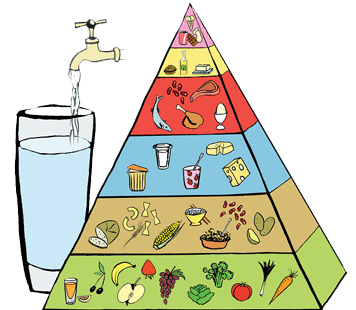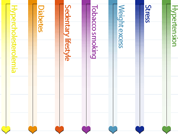This dietary advice, inspired by the Mediterranean diet, play an important and demonstrated role in protecting the cardiovascular system. It encourages a varied and colorful diet that's rich in taste and protective elements, and is simple to follow.
This diet emphasizes the intake of fruits, vegetables, aromatic herbs, the use of quality oils, and focuses on whole grain cereal, all of which guarantee a substantial intake of nutritious and protective substances such as antioxidants, mono-unsaturated and polyunsaturated omega-3 fats, fibre, and complex sugars.
This diet is moderate in to animal products, saturated fats or processed foods.

The food pyramid* is a model for presenting a balanced daily diet, drawing from each food group, bearing in mind that no food or food group on its own can achieve a balanced diet. Food at the bottom of the pyramid is the highest quantity of food that the body needs. The role of dietary fiber is to decrease blood cholesterol levels, help maintain a better blood sugar level in patients with diabetes, decrease energy intake and help with weight control. They can improve bowel function.
*ADiGe / Geneva Dietician Branch
- Fruits and vegetables
- Flour and starch based foods
- Dairy products
- Meat, poultry, fish, seafood, eggs
- Fatty seasoning products and oleaginous fruits
- A word on trans fats
- Water
- A word on salt
Fruits and vegetables
They are rich in antioxidants such as vitamin C, A and carotene, all of which protect arteries, they are also rich in fiber which stimulates bowel function and helps to eliminate bad cholesterol. This food group should represent an important part of meals and snacks, with an intake of 5 portions a day.
Diversify color intake to maximize antioxidants; green vegetables contain more omega-3 polyunsaturated fats, which help blood thinning. Raw, cooked, dried, in juice form…a minimum of 600 g of this food group each day. Vary the manner in which you eat these foods and use seasonal variations.
Flour and starch based foods
These provide energy in the form of complex carbohydrates (sugars). These foods should be included in all 3 main meals of the day. They include potatoes, bread, pasta, and grains such as rice, wheat, millet, barley, oat, and corn. They fill you up. In their whole grain form, the content of fiber, vitamin B and minerals is higher. Contrary to common belief, they do not lead to weight gain because they keep you full for hours after a meal.
Dry legumes (lentils, chickpeas, beans, fava beans) provide both carbohydrates and proteins. The can be eaten as meat substitutes and, eaten with a suitable grain, provide a complete protein. Their advantage lies in the absence of fat, the provision of fibre and group B vitamins, and the fact that they are inexpensive. Soya based foods, such as tofu, are known for their high quality fatty acids and being low in saturated fats.
Dairy products
As a source of calcium and vitamin D to maintain bone strength, they supplement protein intake. However they also contain saturated fats which, if taken in too excessive quantities, increase bad cholesterol. It is therefore wise to choose low-fat dairy products and to avoid yogurts, and products enriched with cream.
Cheese is considered to be a source of protein, instead of meat, if consumed in moderation. Choose cheeses that are not enriched with cream, that have a maximum 45% fat content, and try to limit cheese based meals such as fondue and Raclette to once every 3 weeks. Alpine cheeses generally have more interesting fat contents, in part due to the quality of the pasture the animals eat. Three dairy product portions a day are recommended (4 after 65 years of age), with 1 portion corresponding to 2 dl of milk, 1 yogurt, 30 g of hard cheese or 300 g of soft white cheese.
Meat, poultry, fish, seafood, eggs
These foods provide protein, the basic component of muscles and other organs, as well as easily digested iron. However, meat and poultry are also a source of saturated fats which can lead to increased levels of bad cholesterol (LDL) in the blood. It is advised to eat these products a maximum of 4 to 5 times a week (1 red meat), and to choose lean portions such as filets and steaks.
Cooked meats are rich in saturated fats and salt. One should choose dried meats, cooked ham or roast beef. Giblets, eggs, and crustaceans have long been “accused” of increasing cholesterol levels. They are a source of dietary cholesterol but in fact have little influence on blood cholesterol levels. As such, they don’t have to be banned from diets. Eggs are an excellent source of protein and can be used as a meat substitute twice a week. Seafood, low in fat, is rich in zinc, selenium and 2 antioxidants. Giblets can be eaten twice a month.
Fish, especially oily ones, should be eaten twice a week because they contain essential omega-3 polyunsaturated fats (EPA, DHA), which prevent clot formation and decrease blood triglyceride levels.
Fatty seasoning products and oleaginous fruits
One should use quality oils every day, with combinations such as olive and colza oil: these 2 oils provide monounsaturated fats which have a positive effect on cholesterol levels. Colza oil contains omega-3 fats (alpha-linolenic fatty acid) that have important cardioprotective properties. These unrefined oils are also a source of vitamin E, another antioxidant.
Oils made from sunflower, corn, wheat, raison pip, and nut….are rich in omega-6 fats (alpha-linolenic fatty acid), which increase oxidation: their use should be limited.
One should therefore give preference to the olive-colza oil combination, and keep butter limited to breakfast with, for example, a maximum intake of 10 g. Margarines are not recommended because they often contain low quality fats. Have a handful of nuts, almonds or hazelnuts 3 to 4 times a week. This is the best way to consume protective fats.
A word on trans fats…
These fats are food industry products, originally produced for margarines, are found in many processed foods which contain partially or completely hydrogenated oils or fats including pre-cooked meals, biscuits, cooking doughs, pastries, chocolate bars, chips, cereal bars, breakfast cereals…
The labels “hydrogenated palm, colza or sunflower oil“, “vegetable fat” or “ partially hydrogenated animal fat” are often found on food packages. These are similar to saturated fats, and as such these trans fats increase bad cholesterol and decrease good cholesterol. They should be avoided.
Water
This is the primary element in the body and a sufficient supply of water is required to maintain homeostasis, balance and the proper bodily functions. A quantity of 1.5 liters of liquid with no or little added sugar, such as tap water, bottled water, tea, fruit juice, soup….is recommended daily, a quantity that should be increased with increased temperatures or physical activity.
A moderate and regular intake of red wine appears to have a cardioprotective effect, most likely linked to alcohol tanins (antioxidants). This recommended amount corresponds to a maximum of 2 dl for women and 3 dl for men.
The nutritional value of red wine can be found in a healthy and balanced diet with fruits, vegetables, and tea for example, which also contains tanins.
A word on salt
One should use salt sparingly, and opt for aromatic herbs. Avoid keeping salt on the table and eat fresh unprocessed food instead. Too much salt hardens arteries and can increase blood pressure. Certain foods have a high salt content including cheese, giblets, smoked salmon, preserves, bakery products, breakfast cereals, sauces and bouillons, condiments, pre-prepared soups, biscuits, pastries, sodas, ready meals… Opting for fresh unprocessed foods limits your sodium intake.
These recommendations will keep your heart healthy. If you would like to consult a dietician to obtain further information and have an individualized nutritional evaluation, speak with your nurse or physician.
